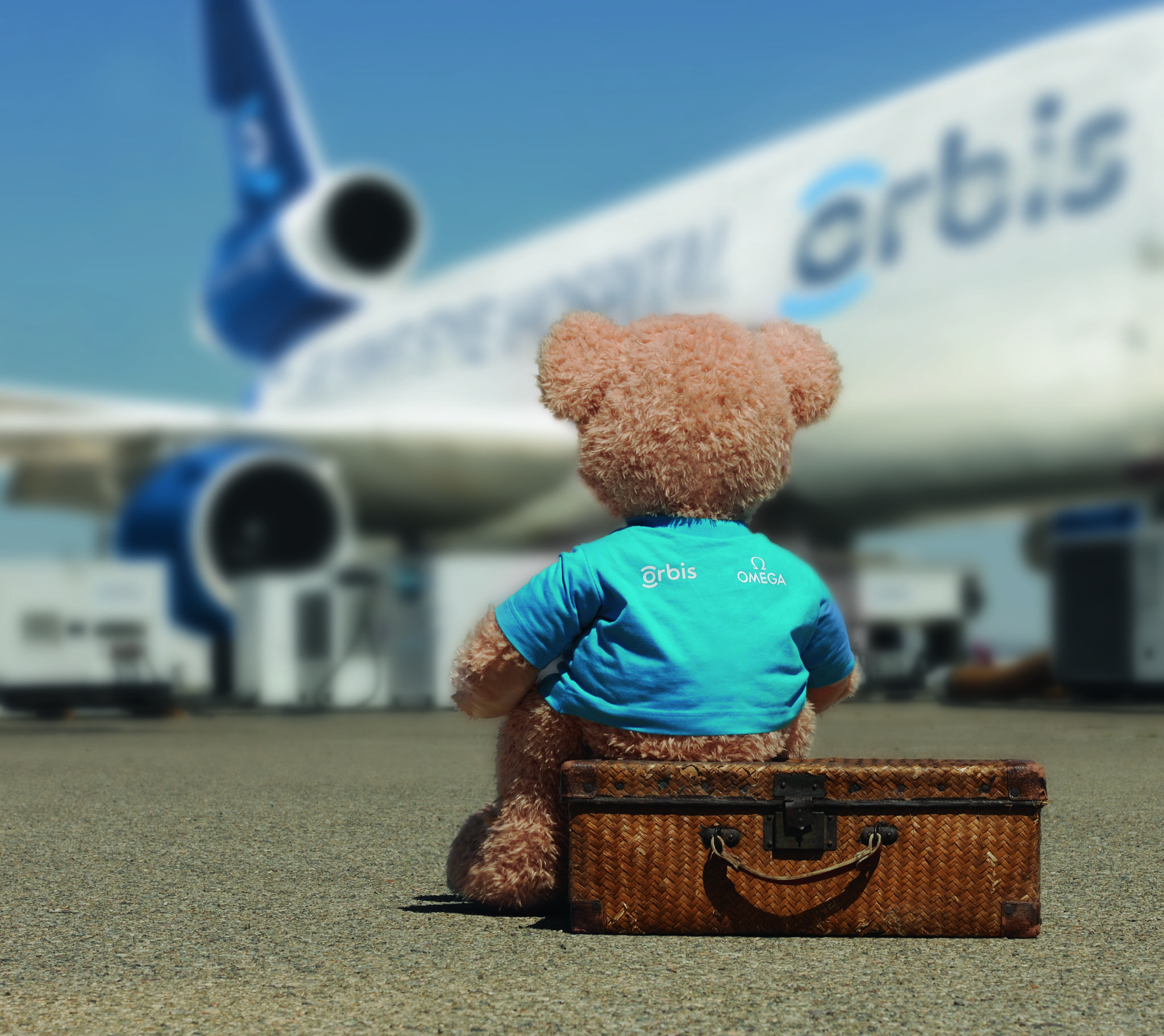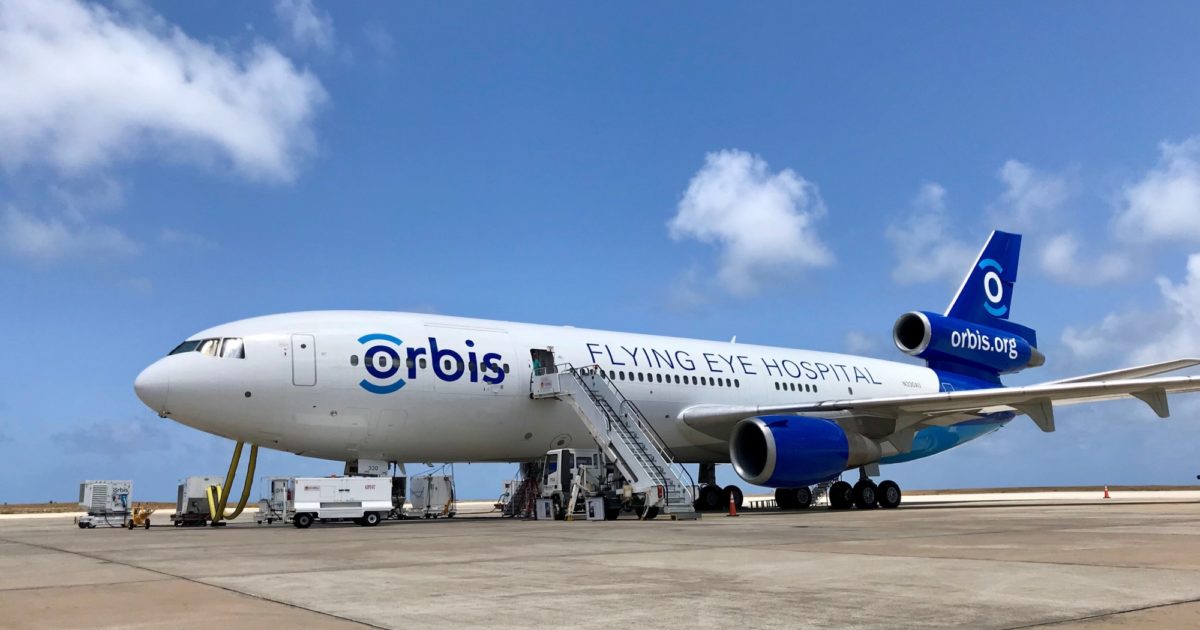The Orbis Flying Eye Hospital, a unique plane equipped with the latest in technology, medical practitioners and equipment will soon land in Dubai. The state-of-the-art teaching facility is complete with operating room, classroom and recovery room and is celebrating its 40th anniversary. I spoke to Florence Branchu, the Director of Orbis in the Middle East.
What is the Flying Eye Hospital about?
The Orbis Flying Eye hospital is an international NGO and a tool to fight against avoidable blindness. The longer someone waits to be treated, the higher their chance of becoming permanently blind. Orbis flies their team of volunteers – elite eye care specialists – to low- and middle-income countries where they share skills and techniques with local medical teams to equip and empower them. A once cargo plane, the interior of the third-generation Flying Eye Hospital has been completely transformed to be a hospital on air.
Not only does it provide a space to train doctors, nurses and medical technicians, but it opens the doors of governments’ representatives so that we can make the case for investing in eye health for all at a policy level.
How does the Flying Eye Hospital work?
This unique aircraft is equipped to teach and train doctors and nurses so that they can support more people with eye health issues in their community. The plane features a classroom, simulation centre and laser suite, operating room and recovery room. We travel the world and have 400 volunteer nurses and surgeons who all have different skills. Government and local partner hospitals bring in their doctors and staff and anyone can access the training. We have cameras throughout and so when our volunteer surgeons, nurses and anaesthetists deliver training beamed to the classroom at the front of the plane. Also, our telemedicine platform – Cybersight – enables us to stream our training to an even wider audience all around the world. The participants can ask questions online to the surgeons and interact with them during surgery.
How many countries has the aircraft flown to and what plans ahead?
Since our Flying Eye Hospital took its first flight in 1982, it has visited more than 95 countries, bringing world-class ophthalmic training to eye care professionals who urgently need it. Today, Orbis continues to focus our efforts in low- and middle-income countries, home to nine out of ten of those with vision loss. Often something as simple as getting a routine cataract surgery or a pair of glasses is all that is needed to restore a person’s vision.
Over multiple decades FedEx has played an indispensable role in helping Orbis achieve its vision of a world in which no one is needlessly blind. Not only did FedEx donate the current airframe of the aircraft, that was converted into the Flying Eye Hospital, they also provide volunteer FedEx pilots to move the Flying Eye Hospital to its programme destinations.
During covid we had to pivot to virtual Flying Eye Hospital projects. The Orbis team kept on crafting online curricula tailored to the training needs of a range of eye care professionals, including ophthalmologists, ophthalmology residents, nurses, and biomedical engineers and technicians. Leveraging our Cybersight platform has enabled us to keep a generation of eye care professionals from falling behind in their education amid the pandemic and enabled us to train more people in more places than ever before.
This year, the aircraft is finally returning to the sky. The Dubai Airports’ community is enabling this stopover before the Orbis Flying Eye Hospital flies to its next sight-saving project. We will take this opportunity to host private visits for our long-term global supporters.
How has this initiative empowered people?
Alongside our Flying Eye Hospital projects, we deliver long-term programmes across Africa, Asia, Latin America and the Caribbean, to strengthen eye care services year-round with our local partners. In Zambia for example, Orbis has worked with a pediatric ophthalmic surgeon for well over a decade. When we started working with Dr Mboni, he was the country’s only pediatric ophthalmologist. In addition to in-country support, our telemedicine platform Cybersight gave him access to ongoing mentoring and very simple things such as having a second opinion for complicated cases. There are stories galore. Sometimes all that people need, is a small cataract operation and they are fine and sometimes more complex surgeries are required. I have been part of such moments of joy. I remember an elderly lady, post cataract operation, came and hugged each one of us since she was so happy to see us. One of my favourite stories is the story of Bulgan from Mongolia. She is such an inspiration. Following a tragic car accident, Bulgan had a sight threatening eye injury. She was treated onboard the Flying Eye Hospital. Years later, she came to us as a translator and even followed the doctor who cured her, through his online lectures. She is on the board in our office in Canada.
“We shouldn’t take our eyesight for granted. Yearly check-ups are essential and can prevent damage”
Getting your eyes checked every year is very important. About 1.1 billion people are blind or have vision loss across the world and 90 percent of it is avoidable. In so many cases, vision loss can be stopped in its tracks. Eye care should be a priority in each country and should be accessible to all, free of cost or at really subsidised rates.
Do you also fly to conflicted zones to empower people?
While in Qatar this first week of November we hosted a free, week-long professional development programme, for women in eye care, from countries receiving humanitarian support from Qatar. Ophthalmologists and nurses from Afghanistan, Iraq, Libya, Palestine, Somalia, Syria, Sudan, and Yemen, were invited to take part in the simulation training, under the leadership of the Qatar Fund for Development and Qatar Charity, endorsed by the Ministry of Public Health. This was delivered by Orbis’s ophthalmic volunteers and staff onboard our unique plane, thanks to the support of Qatar Airways, Hamad International Airport and Qatar Executive.
It’s wonderful to see women so dedicated to serving their community, that they would fly to an unknown country to be trained by people they do not know. But that is the little change we collectively bring in. They completed an online course prior to landing in Qatar, and while onboard the aircraft they have honed their skills using cutting-edge surgical/nursing simulation devices, using virtual reality, artificial eyes, and life-like manikins. This ensures that each step they would normally take when treating a patient, can be practiced as many times as needed, growing confidence.





